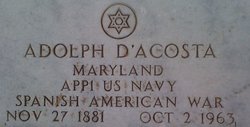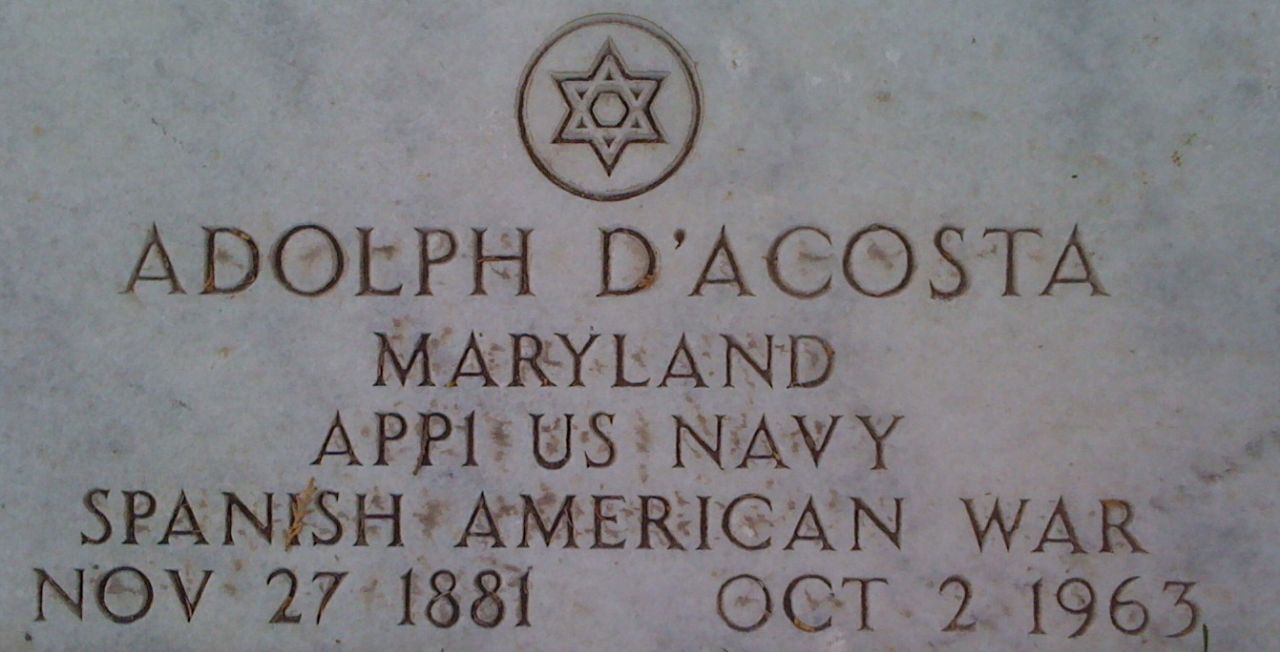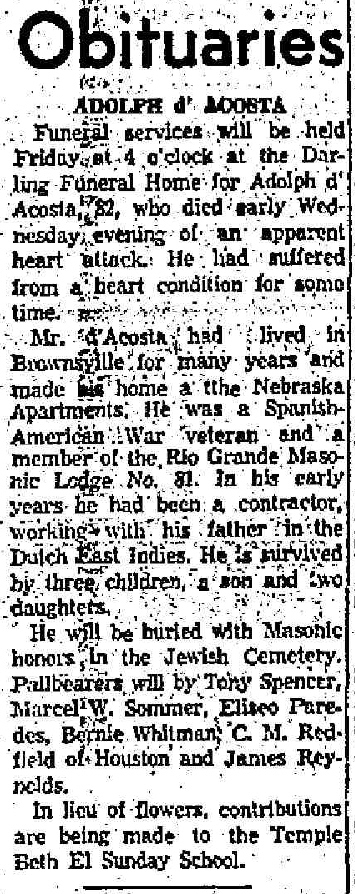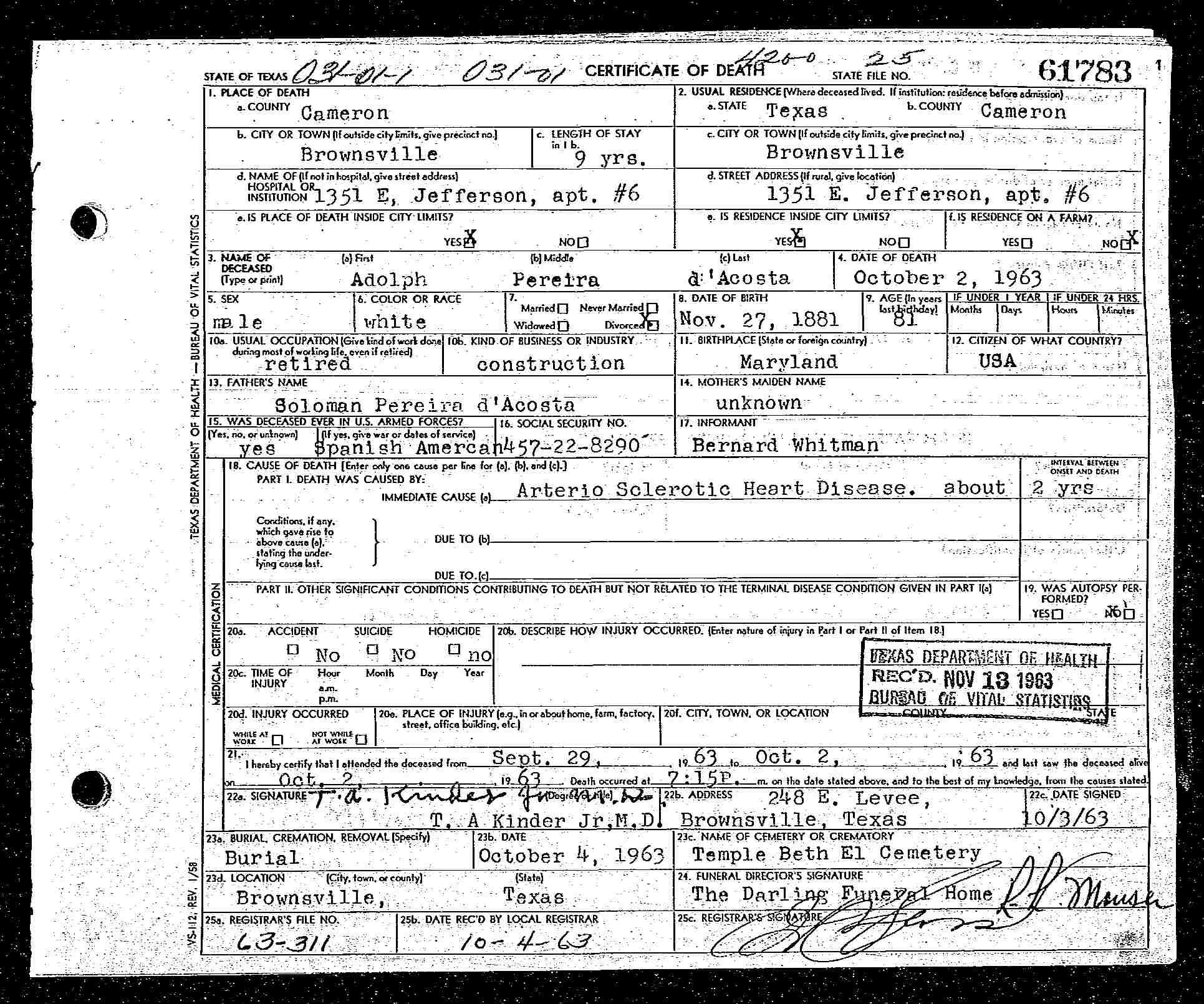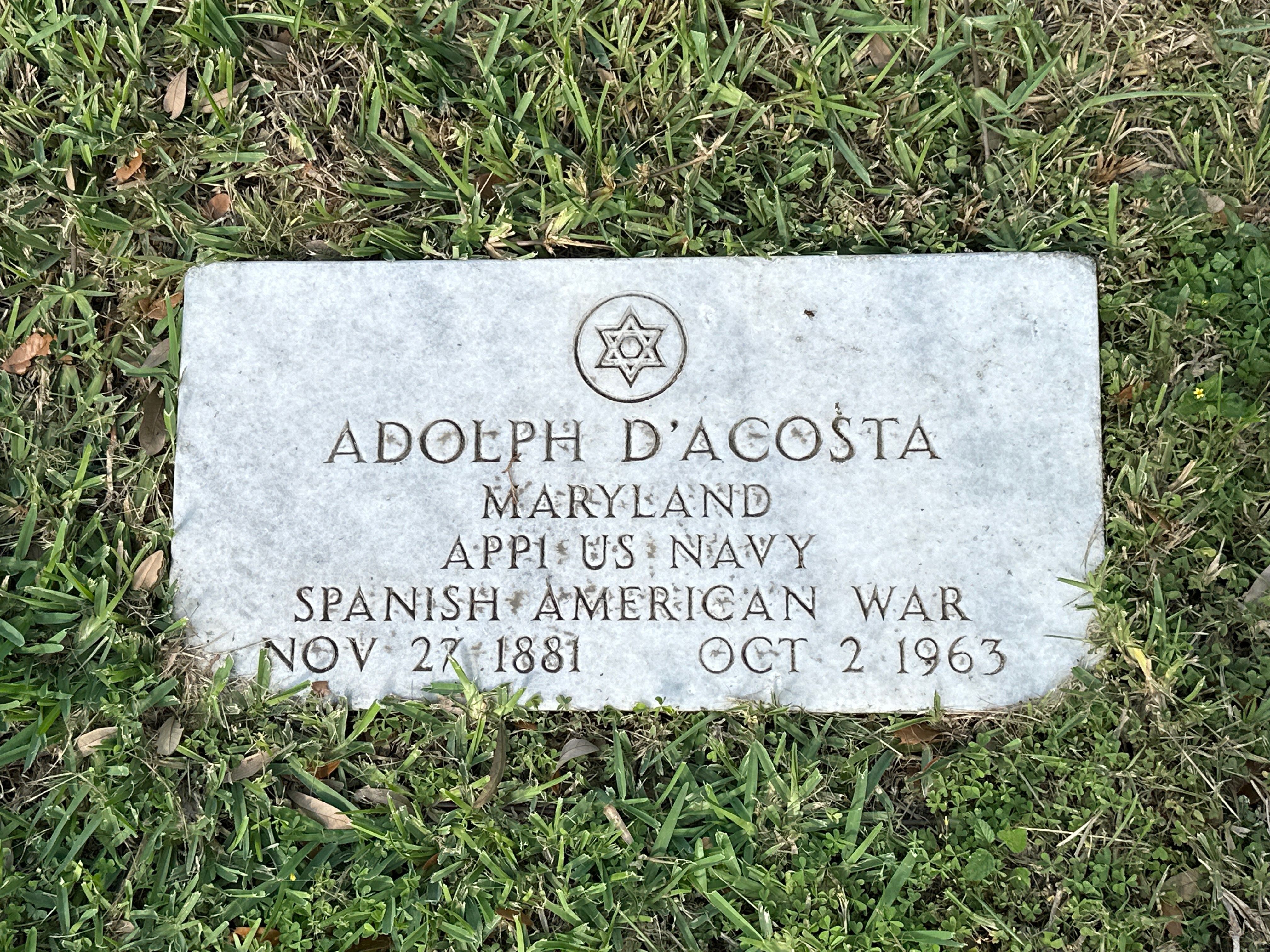Adolph D'Acosta, Veteran of the Spanish-American War
Adolph D'Acosta was born in Jamaica on November 27, 1881. He was the son of a plantation owner and was a descendent of early immigrants to Jamaica. The first Jews in Jamaica came from Spain and Portugal from 1494-1655 fleeing the Spanish Inquisition. To conceal their identity they referred to themselves as "Portuguese" or "Spanish" and practiced their religion secretly. After the British conquest of Jamaica in 1655, the Jews began to practice their religion openly. They were confirmed as British citizens in 1660 and attained full political rights in 1831 which enabled Jews to own property.
In 1898, at 18 years old, Adolph read about the US declaration of war against Spain and remembered stories of abuses done to his family by the Spanish during the Inquisition. He eagerly joined the US military to fight Spain in what became called the Spanish-American War. He served in the US Navy and during the war he was wounded and lost an eye.
The Spanish-American War started in Cuba. The United States disputed the control that Spain had in this hemisphere and supported the Cuban people in their fight for independence from Spain. In 1898, the US deployed the battleship Maine to Cuba to protect US interests. The battleship mysteriously blew up and the US accused Spain of laying a mine. The US declared war on Spain in 1898 and US troops were sent to Cuba.
During the Spanish-American War, the historic Battle of San Juan Hill led by Col. Theodore Roosevelt and the Rough Riders was fought during the intense battles in Cuba. Commodore George Dewey led the US naval squadron into Manila Bay in the Philippines on May 1, 1898, and destroyed the Spanish fleet. D'Acosta was likely part of this battle.
The Spanish-American War of 1898 lasted 4 months and ended Spain's colonial empire in the Western Hemisphere and secured the position of the United States as a Pacific power. The U.S. victory in the war produced a peace treaty that compelled the Spanish to relinquish claims on Cuba, and to cede sovereignty over Guam, Puerto Rico, and the Philippines to the United States.
After the war, D'Acosta established a construction business in the United States and became fascinated with coins. Over a period of years his collection of coins grew and after moving to Brownsville in 1954 at age 73, he went into the business of buying and selling antique and collectable coins in downtown Brownsville.
D'Acosta became acquainted with Bernie Whitman who had a business downtown selling army-navy surplus, diamonds and many other items. Bernie invited D'Acosta to conduct the coin business in Whitman's Army Surplus Store. As D'Acosta got in his later years, Bernie would send his teenaged son, Richard, to keep him company in D'Acosta's apartment. Richard said that this was a duty he eagerly accepted since the alternative was working at the store, which was a job he loathed. Richard would sit watching TV with D'Acosta who smoked cigarette after cigarette of harsh Mexican cigarettes called Delicados. Richard said that they were anything but delicate and he said that Mr. D was a chain smoker who always had one in his yellow-stained hands and sometimes two burning in the large ashtray stand.
Alan Whitman, Richard's younger brother, remembers Adolph D'Acosta as a gentleman and a quiet man of honor. One day, Alan's Dad, Bernie, asked Alan if he had seen Mr. D'Acosta's eye. Before he could answer, D'Acosta removed his glass eye and held it in his palm. Alan said that D'Acosta held it matter-of-factly, not with the intent to scare or be hideous. Alan looked at it with reverence and saw in D'Acosta's good eye that this was a litmus test of acceptance. D'Acosta held his eye proudly as a symbol of war, human frailties, life and death.
Adolph D'Acosta died on October 2, 1963, and was buried in the Hebrew Cemetery with full Masonic honors. He was a member of the Rio Grande Masonic Lodge No. 81. Bernie Whitman attended to the details of his funeral and arranged for his military tombstone. D'Acosta is the only veteran of the Spanish-American War buried in the cemetery.
Also buried in the Hebrew Cemetery are Bernie Whitman and his wife Mildred Sommer Whitman.
contributor Larry Holtzman
Adolph D'Acosta, Veteran of the Spanish-American War
Adolph D'Acosta was born in Jamaica on November 27, 1881. He was the son of a plantation owner and was a descendent of early immigrants to Jamaica. The first Jews in Jamaica came from Spain and Portugal from 1494-1655 fleeing the Spanish Inquisition. To conceal their identity they referred to themselves as "Portuguese" or "Spanish" and practiced their religion secretly. After the British conquest of Jamaica in 1655, the Jews began to practice their religion openly. They were confirmed as British citizens in 1660 and attained full political rights in 1831 which enabled Jews to own property.
In 1898, at 18 years old, Adolph read about the US declaration of war against Spain and remembered stories of abuses done to his family by the Spanish during the Inquisition. He eagerly joined the US military to fight Spain in what became called the Spanish-American War. He served in the US Navy and during the war he was wounded and lost an eye.
The Spanish-American War started in Cuba. The United States disputed the control that Spain had in this hemisphere and supported the Cuban people in their fight for independence from Spain. In 1898, the US deployed the battleship Maine to Cuba to protect US interests. The battleship mysteriously blew up and the US accused Spain of laying a mine. The US declared war on Spain in 1898 and US troops were sent to Cuba.
During the Spanish-American War, the historic Battle of San Juan Hill led by Col. Theodore Roosevelt and the Rough Riders was fought during the intense battles in Cuba. Commodore George Dewey led the US naval squadron into Manila Bay in the Philippines on May 1, 1898, and destroyed the Spanish fleet. D'Acosta was likely part of this battle.
The Spanish-American War of 1898 lasted 4 months and ended Spain's colonial empire in the Western Hemisphere and secured the position of the United States as a Pacific power. The U.S. victory in the war produced a peace treaty that compelled the Spanish to relinquish claims on Cuba, and to cede sovereignty over Guam, Puerto Rico, and the Philippines to the United States.
After the war, D'Acosta established a construction business in the United States and became fascinated with coins. Over a period of years his collection of coins grew and after moving to Brownsville in 1954 at age 73, he went into the business of buying and selling antique and collectable coins in downtown Brownsville.
D'Acosta became acquainted with Bernie Whitman who had a business downtown selling army-navy surplus, diamonds and many other items. Bernie invited D'Acosta to conduct the coin business in Whitman's Army Surplus Store. As D'Acosta got in his later years, Bernie would send his teenaged son, Richard, to keep him company in D'Acosta's apartment. Richard said that this was a duty he eagerly accepted since the alternative was working at the store, which was a job he loathed. Richard would sit watching TV with D'Acosta who smoked cigarette after cigarette of harsh Mexican cigarettes called Delicados. Richard said that they were anything but delicate and he said that Mr. D was a chain smoker who always had one in his yellow-stained hands and sometimes two burning in the large ashtray stand.
Alan Whitman, Richard's younger brother, remembers Adolph D'Acosta as a gentleman and a quiet man of honor. One day, Alan's Dad, Bernie, asked Alan if he had seen Mr. D'Acosta's eye. Before he could answer, D'Acosta removed his glass eye and held it in his palm. Alan said that D'Acosta held it matter-of-factly, not with the intent to scare or be hideous. Alan looked at it with reverence and saw in D'Acosta's good eye that this was a litmus test of acceptance. D'Acosta held his eye proudly as a symbol of war, human frailties, life and death.
Adolph D'Acosta died on October 2, 1963, and was buried in the Hebrew Cemetery with full Masonic honors. He was a member of the Rio Grande Masonic Lodge No. 81. Bernie Whitman attended to the details of his funeral and arranged for his military tombstone. D'Acosta is the only veteran of the Spanish-American War buried in the cemetery.
Also buried in the Hebrew Cemetery are Bernie Whitman and his wife Mildred Sommer Whitman.
contributor Larry Holtzman
Family Members
Sponsored by Ancestry
Advertisement
Records on Ancestry
Advertisement
